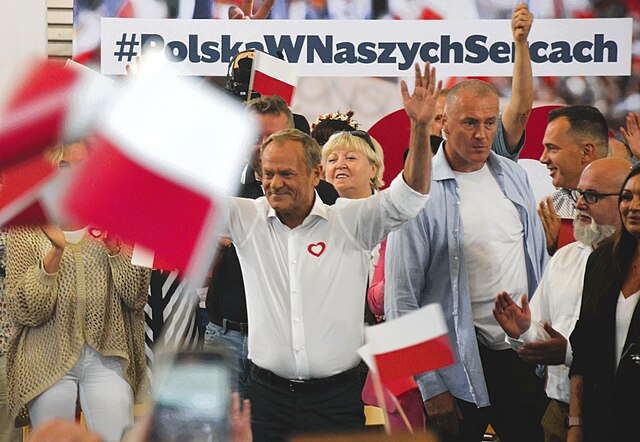WASHINGTON — Poland’s coming elections this weekend could push the country further to the right and away from the interests of America’s Western European allies, foreign policy experts said on Thursday.
The Law and Justice party, or PiS, has governed Poland’s parliament since 2015 and is attempting to win an unprecedented third term in office — a feat never accomplished in the country’s nearly 32-year democratic history. Sunday’s election is expected to be a close race between PiS and the center-right Civic Coalition, or KO.
Former U.S. ambassador to Poland Daniel Fried was critical of the PiS’s foreign policy platform because it has an animus toward neighboring Germany and the European Union. However, he said Poland should be interested in playing a larger part in European politics given the country’s population size and closeness to the ongoing conflict between Russia and Ukraine.
“Poland is poised to play a leading role in Europe’s new Russia policy,” Fried said during a virtual panel on Thursday sponsored by the Brookings Institution. “That would be good for Europe and probably good for Poland. Also, it wouldn’t be good for Vladimir Putin. It would be good for Ukraine. That is what’s being sacrificed by politics and I hope that gets fixed after this election, no matter who wins.”
Anna Gryzmala-Busse, a nonresident senior fellow at Brookings’ Center on the United States and Europe, said during the panel that since PiS came to power in 2015, the political party has attacked the free press and overhauled Poland’s judicial system to be less independent. If PiS wins a plurality of seats this election cycle, she said Poland’s relationship with the EU and Germany will likely worsen.
“PiS conducts foreign policy largely for domestic consumption,” Gryzmala-Busse said. “It’s driven by signaling to its loyal constituency rather than by some sort of long-term vision or long-term proposals for the future of Polish foreign policy.”
Conversely, if the opposition wins control after Sunday’s election, relations with Western Europe could improve, she said. Gryzmala-Busse noted that the leader of the opposition Civic Coalition, Donald Tusk, served as president of the EU’s governing body from 2015 to 2019, adding he could better address Poland’s concerns to its allies.
Fried, who worked in the U.S. State Department for 40 years, emphasized that Poland’s current animosity toward the EU and Germany is due in part to the nation’s rapid transition toward democracy — one he said was much quicker than that of many Western European nations.
“There are a lot of Poles who are discomforted by the rapid modernization of Polish society and the rapid secularization of Polish society, which mirrors what happens in Western Europe,” Fried said. “So you’re going to get some kind of a reaction.”
The former ambassador had some praise for PiS, noting that unlike some other democracies in Central Europe, like Hungary, that have backslid, the party’s policymakers in Poland have been firm supporters of Ukraine and opponents of Russian President Vladimir Putin.
Poland has stood with Ukraine after Russia’s surprise invasion in early 2022. It has also welcomed more than 1.5 million Ukrainian refugees. Last month, however, Prime Minister Mateusz Morawiecki of PiS announced that Poland would cease sending weapons to Ukraine.
Fried indicated that current strains to Poland’s solidarity with Ukraine are largely a result of economic factors. He said grain imports from Ukraine are depressing Polish markets and alienating Polish farmers. Regardless of which party is in power after Sunday’s elections, Fried believes Poland’s stance toward Ukraine will not change.
Milan Nic, a senior research fellow at the German Council of Foreign Relations, said he believes the parliamentary elections could have political repercussions throughout the region. He suggested PiS’s electoral victory in the 2015 parliamentary elections represented a populist revival in Central and Eastern European countries and this year’s vote could potentially do the same.
“I see something similar happening, with however many caveats and differences, because the world has changed and also the region has changed,” Nic said. “But, I think the outcome from Poland is now again determining how far the region will go and how far you can have this bounce back of populism.”

